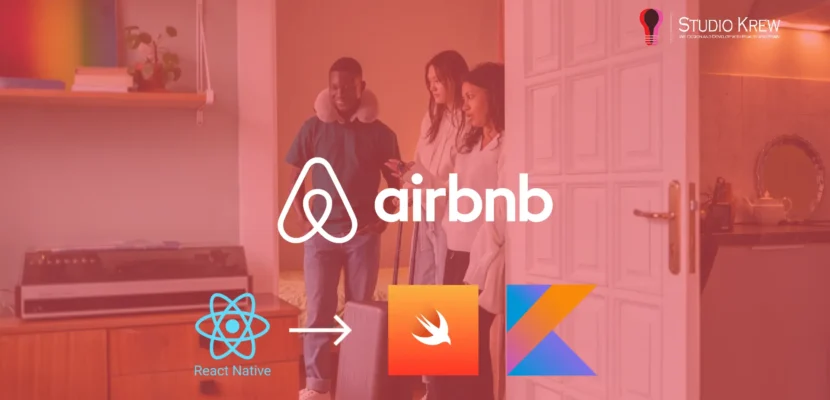In the ever-evolving world of mobile application development, selecting the right tech stack can significantly impact the success or growth of your digital product. One of the most cited case studies in recent years is Airbnb’s transition away from React Native to fully embrace native technologies: Swift for iOS and Kotlin for Android. This decision sent ripples through the developer community, prompting many startups and enterprises to reevaluate their mobile strategies.
As a leading mobile application development company, StudioKrew believes in strategic tech adoption. In this blog, we’ll delve into the strategic thinking behind Airbnb’s migration, the lessons learned, and what this shift means for your business. This will equip you with the knowledge to make informed and strategic decisions for your own tech stack.
Airbnb’s Journey with React Native – What Went Right?
Airbnb’s engineering team has always been at the forefront of mobile innovation. In 2016, they adopted React Native, intending to improve developer velocity and unify their engineering team across platforms. At the time, React Native offered a compelling promise: a single codebase to serve both iOS and Android platforms.
The primary motivation? Efficiency and scalability. Airbnb sought to eliminate duplicate effort across iOS and Android teams, believing that a shared framework could accelerate product development without compromising quality.
The Benefits Airbnb Initially Gained
- Single Codebase Across Platforms: With React Native, Airbnb engineers could write one set of code that ran on both iOS and Android. This significantly reduced the time spent duplicating features for two separate codebases.
- Faster Development Cycles: The company can release new features more quickly, respond to market changes, and experiment with A/B testing at a quicker pace.
- Shared Design System: React Native enabled better alignment between product design and engineering by allowing for component-based development that was consistent across platforms.
- Access to a Growing Developer Ecosystem: React Native’s popularity meant Airbnb could attract skilled JavaScript developers, tapping into a vast community of contributors and third-party libraries.
Airbnb even built internal tools and abstractions around React Native to improve the developer experience and streamline onboarding. For several years, the React Native stack worked well for Airbnb’s feature-rich and highly interactive mobile app.
However, as the app scaled and became more complex, cracks in the architecture began to show. These were not minor hiccups—but foundational limitations that prompted a deeper evaluation of whether React Native was still the right fit for the future.
Explore our cross-platform app development services to understand where frameworks like React Native still shine and when they might reach their limits.
The Challenges That Sparked the Shift
As Airbnb continued to evolve its platform into a global, high-traffic application used by millions across various devices and regions, the limitations of React Native began to interfere with core development and user experience goals.
1. Integration Complexity with Native Modules
One of the most significant challenges was integrating React Native with complex, device-specific native modules. Although the framework provided a bridge to interact with native APIs, it often required custom-written bridges or wrappers to facilitate interaction. This introduced technical overhead and inconsistencies across platforms, making some features more difficult to implement and test.
2. Performance Bottlenecks Due to the JavaScript Bridge
React Native relies on a bridge that facilitates communication between JavaScript and native components. While adequate for simpler apps, this bridge became a bottleneck in more complex flows involving high-frequency interactions, animations, and data-intensive tasks. This led to UI delays and degraded performance in critical user journeys.
3. UI Inconsistencies Across Platforms
Airbnb places a strong emphasis on a polished and intuitive user experience. However, React Native components did not always behave consistently across iOS and Android, forcing the team to write custom native modules to fix platform-specific bugs, undermining the original goal of code reuse.
4. Increased Technical Debt and Maintenance Complexity
As Airbnb continued to build on top of React Native, maintaining a hybrid architecture introduced growing complexity. Teams had to manage a combination of JavaScript, native Swift/Objective-C, and Kotlin/Java codebases. This fragmented approach led to build-time issues, inconsistent development workflows, and code duplication in several modules.
5. Steep Learning Curve for New Engineers
Onboarding new developers became more challenging. Engineers needed to be proficient in both JavaScript and native technologies to be effective, which slowed productivity and increased ramp-up time. Airbnb’s investment in internal tooling for React Native also added a proprietary layer, further increasing complexity.
6. Barriers to Scaling and Innovation
Lastly, as the company looked to scale and incorporate cutting-edge mobile features (e.g., AR, advanced animations, machine learning integration), React Native’s limitations became more pronounced. The bridge architecture couldn’t keep up with the responsiveness and precision required for these native capabilities, leading to significant barriers in implementing these features at the desired level of performance and user experience.
For apps requiring long-term performance optimization and advanced platform integration, our application maintenance company services ensure scalability, reliability, and peak efficiency.
These challenges weren’t just isolated incidents—they highlighted a recurring friction between Airbnb’s product vision and the architectural limitations of React Native. Thus, the decision to move toward native development wasn’t just about fixing bugs; it was also about improving the overall user experience. It was about future-proofing the app with a more performant, stable, and scalable foundation.
Transitioning to Native – Why Swift and Kotlin?
Once Airbnb decided to sunset React Native, it had to choose which native technologies would carry its mobile platforms forward. After evaluating options, Airbnb announced in 2018 that it would retire React Native and begin application porting to native tech stacks: Swift for iOS and Kotlin for Android—the modern, officially supported languages by Apple and Google, respectively. The move was not just a shift in code but a cultural and architectural transformation.
Why Swift for iOS?
Swift, introduced by Apple as a modern alternative to Objective-C, quickly became the go-to language for iOS development. Its clean syntax, safety features, and seamless integration with Xcode and Apple frameworks made it the obvious choice for a company like Airbnb that required cutting-edge UI, high-performance animations, and reliable access to native APIs.
Benefits of Airbnb Unlocked:
- Increased performance through compiled native code
- Memory safety and type inference leading to fewer runtime errors
- Seamless access to Apple’s latest SDKs and APIs, including ARKit, Core ML, and Haptics
- Future-ready architecture that aligns with Apple’s continued platform evolution
Want to build high-performance iOS apps? Explore our Swift app development services for a scalable and feature-rich mobile experience.
Why Kotlin for Android?
Airbnb’s Android team embraced Kotlin as its primary language, replacing Java’s verbose syntax with a more expressive and modern alternative. Kotlin, officially supported by Google, helped Airbnb build safer, more concise, and more maintainable code.
Advantages of Kotlin Delivered:
- Concise and readable code, reducing boilerplate
- Null safety features that eliminated an entire class of bugs
- Coroutines for asynchronous programming, boosting responsiveness
- Smooth interoperability with legacy Java code
Kotlin’s KMP ecosystem now supports multi-platform projects, providing Airbnb with a long-term roadmap to evolve its Android infrastructure without significant disruptions.
Interested in future-ready Android solutions? Check out our Kotlin app development company offerings to elevate your mobile product.
Results of the Native Transition
By moving to Swift and Kotlin, Airbnb was able to:
- Drastically reduce performance bottlenecks and improve startup times
- Simplify its development workflow by eliminating complex bridging layers
- Provide a smoother, more consistent user experience on both platforms
- Empower specialized teams to focus intensely on platform-specific innovations
This transition was more than just a technical decision—it was a strategic realignment with long-term scalability, performance, and user satisfaction at its core.
Need help choosing between native and hybrid? StudioKrew’s application development experts can guide you through the decision-making process with a tailored strategy that fits your goals.
Strategic Takeaways for Product Leaders
Airbnb’s migration from React Native to native development isn’t a universal indictment of cross-platform frameworks. Instead, it’s a masterclass in making technology choices based on long-term scalability, product complexity, and user expectations. Here’s what product owners, CTOs, and business leaders can learn from Airbnb’s decision:
When React Native Still Makes Sense:
- MVP and Early-Stage Products: For startups or businesses building their minimum viable product (MVP), React Native can significantly reduce time-to-market and development costs.
- Feature-Light Applications: Apps that don’t require advanced animations, native hardware access, or platform-specific integrations can thrive on React Native.
- Tight Deadlines or Budget Constraints: React Native can offer value for teams trying to validate ideas quickly.
StudioKrew supports startups and growing businesses with cross-platform mobile app development services tailored to maximize speed and budget efficiency.
When to Prioritize Native Development:
- Complex User Interfaces: Native development is better suited for apps that require sophisticated animations, real-time graphics, or custom gestures.
- Heavy Use of Device APIs: Apps using AR, Bluetooth, biometrics, or hardware acceleration benefit from the deep integration offered by Swift and Kotlin.
- Enterprise-Grade Scalability: For apps that expect rapid scaling or require high uptime and performance under load, native stacks offer better resource optimization.
- Team Specialization: If you have dedicated iOS and Android teams, building in their respective native languages allows more profound platform mastery and faster problem resolution.
Also Read: How ERP Mobile Apps are Reshaping Field Operations
Key Questions to Ask Before Choosing Your Stack:
- What are the performance expectations for your app?
- How often will you push updates and new features?
- Do you need access to platform-specific APIs?
- Is your budget suited for parallel development across iOS and Android?
At StudioKrew, our consulting-led approach ensures that your product strategy aligns with the right technology foundation. Whether it’s a rapid MVP with React Native or long-term growth with Swift or Kotlin, we help businesses make decisions that minimize technical debt and maximize ROI.
Thinking of a new app or scaling your current one? Our application development company services are designed to help you adapt and grow with confidence.
Native vs React Native – Comparative Breakdown
To help product leaders, developers, and decision-makers visualize the tangible differences between native and cross-platform mobile development, here’s a side-by-side comparison of React Native vs Native Swift/Kotlin based on key performance and architectural metrics:
| Criteria | React Native | Native (Swift/Kotlin) |
|---|---|---|
| Performance | Moderate; potential lags due to JavaScript bridge | High; compiled code offers smooth performance and faster load times |
| UI/UX Capabilities | Limited customization; platform-specific tweaks required | Full access to native UI components and animations |
| Access to Device APIs | Requires custom bridges or third-party plugins | Direct, seamless access to platform APIs and SDKs |
| Code Reusability | High; shared business logic and UI components across iOS and Android | Low; platform-specific codebases but optimized for each device |
| Developer Availability | Easier to hire JavaScript developers | Requires specialized Swift/Kotlin developers |
| Development Speed | Faster for MVPs and prototypes | Slower initially but better suited for long-term growth |
| Maintenance Complexity | High due to bridging, dual runtime environments, and third-party dependencies | Lower due to unified toolsets and native environment stability |
| Scalability | Becomes complex as app grows in size and features | Scales more gracefully with larger and more complex apps |
While React Native is an excellent option for speed and budget-conscious development, native app development offers superior performance, reliability, and user experience, especially when building for scale.
Discover how StudioKrew helps you determine the best approach through a custom consultation. Visit our mobile app development services to get started.
What This Means for Modern App Development
Airbnb’s transition away from React Native represents a broader shift in the mobile development landscape. It shows that while hybrid frameworks like React Native have their place, they’re not always the best fit for every stage of a company’s growth.
The Rise of Hybrid-First, Native-Next Strategies
More startups are beginning with hybrid frameworks to get their product to market quickly, then transitioning to native stacks as the need for performance, scalability, and deep platform integration increases. This agile approach enables rapid iteration early on, without committing to a long-term compromise.
Platform-Centric User Experience is Non-Negotiable
Today’s users expect apps to feel “at home” on their devices. Native development enables pixel-perfect control over UI components, animations, and system behaviors, creating more immersive and intuitive experiences. Companies with a large and diverse user base—like Airbnb—can’t afford UX fragmentation.
The Need for Future-Ready Architectures
With the increasing integration of AR, AI/ML, and real-time features, native stacks offer far better access to advanced SDKs and device capabilities. Whether it’s Siri shortcuts, on-device machine learning, or biometric security, native tech delivers where hybrids often stumble.
StudioKrew’s Role in Modern Mobile Development
At StudioKrew, we help brands choose the best-fit approach for their product lifecycle. Our team has successfully developed, scaled, and transitioned applications across:
- React Native
- Flutter
- Swift and Objective-C
- Kotlin and Java
Whether you’re just starting or planning a tech overhaul, our application development company guides you through platform selection, architecture design, and sustainable growth.
Explore application development for enterprises and startups that scale with your vision.
How StudioKrew Helps You Choose the Right Tech Stack
At StudioKrew, we understand that there is no universal solution in mobile app development. The right technology stack depends on your product goals, budget, target audience, and long-term vision. That’s why we don’t just build apps—we provide strategic guidance and tech architecture tailored to your specific needs.
Tech Stack Assessment & Roadmap
We begin every project with a comprehensive analysis of your product vision and technical requirements. Whether you’re scaling an MVP or rebuilding an enterprise-grade platform, we craft a roadmap that considers performance, maintainability, and cost-efficiency.
Native & Cross-Platform Development Expertise
Our seasoned developers have hands-on experience with all major stacks:
- Swift and Objective-C for high-performance iOS applications
- Kotlin and Java for Android apps built for scale
- React Native and Flutter for rapid cross-platform MVPs
We help you understand when to go native, when to go hybrid, and when to mix both.
Seamless Migration Services
Planning to transition from React Native to Swift or Kotlin, like Airbnb did? Our migration services ensure a clean, scalable transition without downtime. From re-architecting your backend to porting UI/UX, we make the migration journey smooth and future-ready.
Learn more about our application development and application maintenance services that support businesses through every stage of their mobile evolution.
Collaborative, Transparent Approach
We partner closely with your team throughout the project lifecycle. From sprint planning to post-launch support, our agile methodology ensures adaptability, transparency, and fast feedback loops.
At StudioKrew, we’re not just a development vendor—we’re your long-term technology partner.
Ready to explore your ideal tech stack? Get in touch with our experts today at studiokrew.com and let’s architect something amazing.

Final Thoughts: The Future is Context-Driven
Airbnb’s decision to shift from React Native to Swift and Kotlin wasn’t made in haste—it was the result of performance metrics, user expectations, and long-term vision. This move signifies an important lesson: your technology choices must evolve with your product.
While React Native still plays a critical role in enabling fast and cost-effective development, it’s not always ideal for mature, high-performance platforms. Native stacks, though more resource-intensive, offer the fine-grained control, performance, and scalability required to deliver exceptional user experiences at scale.
At StudioKrew, we echo this context-first philosophy. We evaluate your goals, growth plans, and target users to build a solution that evolves with you, from MVP to global scale.
Whether you’re launching your first app or considering a tech migration like Airbnb, let’s make your mobile roadmap future-ready. Start your journey with StudioKrew.





